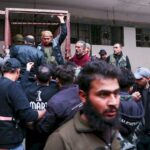By Kimberly Hayek
The U.N. Security Council voted Thursday to end terrorism-related sanctions on Syria’s interim president and interior minister, acknowledging the country’s change after Bashar al-Assad was deposed in early December 2024.
The resolution, sponsored by the United States, was adopted via 14 votes in favor and an abstention by China. It removes Ahmed al-Sharaa—previously known as Mohammed al-Jolani—leader of political and military group Hayat Tahrir al-Sham (HTS), and Interior Minister Anas Khattab from sanctions aimed at ISIS and al-Qaida associates.
The move comes ahead of a reported meeting between al-Sharaa and President Donald Trump in Washington next week.
Thursday’s decision means al-Sharaa and Khattab will no longer be subject to asset freezes and travel bans, which were imposed in 2014 when HTS was designated a terrorist organization by the United Nations.
In May, the United States, the UK, and the EU lifted measures targeting Syria worth about $15 billion that restricted asset transfers and trade. The United States then removed HTS’s designation as a foreign terrorist organization in July. The UK did the same in October.
The U.N. resolution recognizes the interim Syrian government’s pledges for unencumbered humanitarian access, fighting terrorism, including against ISIS and al-Qaida, and preserving human rights.
U.S. Ambassador Mike Waltz viewed it as a “strong political signal” recognizing Syria’s new era.
The Syrian government, said Waltz, “is working hard to fulfill its commitments on countering terrorism and narcotics, on eliminating any remnants of chemical weapons, and promoting regional security and stability as well as an inclusive, Syrian-led and Syrian-owned political process.”
Syria’s delegate, Ambassador Ibrahim Abdulmalik Olabi, celebrated the decision.
“We consider this resolution a sign of a growing confidence in the new Syria, its people and its leadership,” he said, calling it a “badge of honour.”
The Security Council has regularly approved travel exemptions for al-Sharaa this year, meaning the upcoming White House meeting between Trump and al-Sharaa did not hinge on the U.N. vote.
Al-Sharaa, in 2005, joined the organization that would become Al Qaeda in Iraq (AQI), according to a congressional report published in September. Al-Sharaa, according to a former U.S. intelligence official, led an AQI cell.
Al-Sharaa was arrested by U.S. forces in Iraq in about 2005 and held in Camp Bucca until his release in either 2010 or 2011. After returning to Syria, he helped found the al-Nusra Front (al-Qaida’s Syrian affiliate) in early 2012. He later severed his group’s formal relationship with al-Qaida in 2016 and oversaw its rebranding into HTS in 2017.
In February, a European Parliament report outlined the reasons behind action being taken by multiple countries to delist the Syrian government from sanctions.
“Internally, the HTS leadership has taken several measures to ensure continuity of governance and prevent anarchy in Syria, for instance, by working with former regime officials to preserve state institutions and making efforts to disarm and integrate the various armed groups into the security forces,” reads the report.
Reuters contributed to this report.





